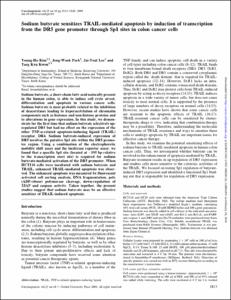Sodium butyrate sensitizes TRAIL-mediated apoptosis by induction of transcription from the DR5 gene promoter through Sp1 sites in colon cancer cells
- Keimyung Author(s)
- Park, Jong Wook; Kwon, Taeg Kyu
- Department
- Dept. of Immunology (면역학)
- Journal Title
- Carcinogenesis
- Issued Date
- 2004
- Volume
- 25
- Issue
- 10
- Abstract
- Sodium butyrate, a short-chain fatty acid naturally present in the human colon, is able to induce cell cycle arrest, differentiation and apoptosis in various cancer cells. Sodium butyrate is most probably related to the inhibition of deacetylases leading to hyperacetylation of chromatin components such as histones and non-histone proteins and to alterations in gene expression. In this study, we demonstrate for the first time that sodium butyrate selectively up-regulated DR5 but had no effect on the expression of the other TNF-α-related apoptosis-inducing ligand (TRAIL) receptor, DR4. Sodium butyrate-induced expression of DR5 involves the putative Sp1 site within the DR5 promoter region. Using a combination of the electrophoretic mobility shift assay and the luciferase reporter assay, we found that a specific Sp1 site (located at −195 bp relative to the transcription start site) is required for sodium butyrate-mediated activation of the DR5 promoter. When HCT116 cells were incubated with sodium butyrate and TRAIL, enhanced TRAIL-mediated apoptosis was observed. The enhanced apoptosis was measured by fluorescent activated cell sorting analysis, DNA fragmentation, poly (ADP-ribose) polymerase cleavage, down-regulation of XIAP and caspase activity. Taken together, the present studies suggest that sodium butyrate may be an effective sensitizer of TRAIL-induced apoptosis.
Key words
TRAIL, TNF-α-related apoptosis-inducing ligand
- Publisher
- School of Medicine
- Citation
- Young-Ho Kim et al. (2004). Sodium butyrate sensitizes TRAIL-mediated apoptosis by induction of transcription from the DR5 gene promoter through Sp1 sites in colon cancer cells. Carcinogenesis, 25(10), 1813–1820. doi: 10.1093/carcin/bgh188
- Type
- Article
- ISSN
- 0143-3334
- Appears in Collections:
- 1. School of Medicine (의과대학) > Dept. of Immunology (면역학)
- 파일 목록
-
-
Download
 oak-aaa-00863.pdf
기타 데이터 / 918.05 kB / Adobe PDF
oak-aaa-00863.pdf
기타 데이터 / 918.05 kB / Adobe PDF
-
Items in Repository are protected by copyright, with all rights reserved, unless otherwise indicated.